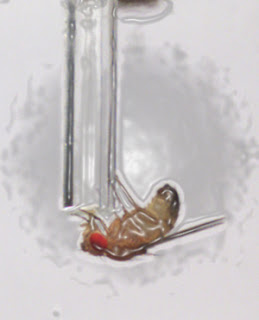Sometimes, researchers conduct studies that are seemingly useless, but provide surprising results. Such is the case of a study performed on male fruit flies that were observed in their efforts to find a female mate. Those who did not manage to find a partner to have sex with turned to consumption of alcohol instead. It appears as if they use it as a substitute for not being able to reproduce, which is what we would think to be typical human behaviour. The researchers from the University of California in San Francisco who performed the study suspect it has something to do with chemicals in the brain.
Behaviour
The Californian scientists set to find out what happens if male fruit flies face sexual rejection. Male and female flies were put together and given the liberty to drink something containing alcohol. When analysing their behaviour, the researchers found male fruit flies that failed to be sexually successful drank far more alcohol than their sexually satisfied counterparts. By increasing their alcohol intake, they also changed their behaviour: eventually the sexually frustrated flies just gave up trying to mate.
Brain
By diving deeper into the biology behind alcoholic behaviour in fruit flies, the scientists were able to find a correlation with a certain protein that is used in the brain. It is called neuropeptide F, and it regulates certain behaviour in fruit flies. Levels of this protein accurately predicted fruit fly behaviour: because neuropeptide F gives a feeling of reward, sexually frustrated flies likely sought to increase their protein levels by alternative means. To further illustrate the role of neuropeptide F, the scientists showed that artificially lowering its levels in sexually satisfied flies made them drink more alcohol.
Humans
Fruit flies are often used as a model for humans, because a lot of genes or proteins are very similar. As it turns out, we possess a molecule that is very similar to neuropeptide F, but instead we call it neuropeptide Y. It is linked with regulating various processes in the brain, such as food intake, energy use, memory and learning. It is also linked with addiction. Because of its functions in the reward system, the fruit fly study gives us an explanation why people are excessive alcohol consumers or drug users: they may lack the required levels of 'brain satisfaction'. A decrease in neuropeptide Y was already linked to increased food intake or increased levels of stress. Even though we still need to confirm its exact role in humans, future therapies could be based upon this brain protein.
Behaviour
The Californian scientists set to find out what happens if male fruit flies face sexual rejection. Male and female flies were put together and given the liberty to drink something containing alcohol. When analysing their behaviour, the researchers found male fruit flies that failed to be sexually successful drank far more alcohol than their sexually satisfied counterparts. By increasing their alcohol intake, they also changed their behaviour: eventually the sexually frustrated flies just gave up trying to mate.
 |
| A fly drinking alcohol. |
By diving deeper into the biology behind alcoholic behaviour in fruit flies, the scientists were able to find a correlation with a certain protein that is used in the brain. It is called neuropeptide F, and it regulates certain behaviour in fruit flies. Levels of this protein accurately predicted fruit fly behaviour: because neuropeptide F gives a feeling of reward, sexually frustrated flies likely sought to increase their protein levels by alternative means. To further illustrate the role of neuropeptide F, the scientists showed that artificially lowering its levels in sexually satisfied flies made them drink more alcohol.
Humans
Fruit flies are often used as a model for humans, because a lot of genes or proteins are very similar. As it turns out, we possess a molecule that is very similar to neuropeptide F, but instead we call it neuropeptide Y. It is linked with regulating various processes in the brain, such as food intake, energy use, memory and learning. It is also linked with addiction. Because of its functions in the reward system, the fruit fly study gives us an explanation why people are excessive alcohol consumers or drug users: they may lack the required levels of 'brain satisfaction'. A decrease in neuropeptide Y was already linked to increased food intake or increased levels of stress. Even though we still need to confirm its exact role in humans, future therapies could be based upon this brain protein.

No comments:
Post a Comment